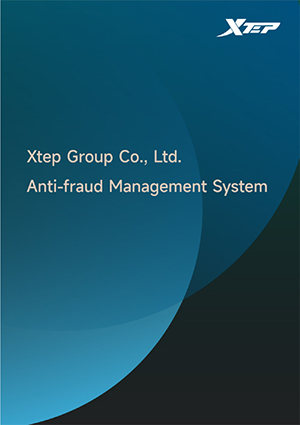Sustainability
Anti-corruption
The Group upholds a zero-tolerance approach towards corruption, bribery, extortion, fraud and money laundering. An anti-fraud Management system has been established to identify, report, investigate and address fraud risks across operations. Informed by national policies on internal controls, such as the “Basic Norms for Internal Control” and “Guidelines for Application of Enterprise Internal Controls”, we established our “Anti-Corruption Policy”, “Anti-fraud Management System”, and “Code of Integrity”, which set clear expectations for all employees. Risk assessments are conducted to diagnose any vulnerabilities within the critical business operations. For details, please refer to our Anti-fraud Management System.
Our Sustainability Governance Structure
At Xtep, we believe that a robust governance framework is always the cornerstone of sustainable development and value creation. Our sustainability governance structure establishes a solid foundation for integrating sustainability at every level of the Group, advancing our sustainability priorities company-wide.
The Board retains the ultimate responsibility for overseeing sustainability issues, and it is supported by the Sustainability Committee (the “Committee”) and the Sustainability Working Group. The Committee is chaired by our non-executive director (“NED”) Mr. Tan Wee Seng, and with executive directors Mr. Ding Shui Po and Ms. Ding Mei Qing, as well as independent non-executive director Ms. Chan Yee Wah, as members. The key responsibilities of the Committee include:
- Proposing and recommending to the Board on the Company’s sustainability objectives, strategies, priorities, and goals;
- Overseeing, reviewing and evaluating actions taken by the Company in furtherance of the sustainability priorities and goals;
- Reviewing and reporting to the Board on sustainability risks and opportunities;
- Identifying, monitoring and reviewing material sustainability issues that could impact the business operations and performance of the Company;
- Overseeing and reviewing the Company’s sustainability policies, practices, frameworks and management approach, and recommending improvements;
- Reviewing and advising the Board on the Company’s annual ESG Report and any relevant public disclosures as regards to its sustainability performance;
- • Performing such further functions related or incidental to the foregoing which the Committee deems appropriate.
For details, please refer to the Terms of Reference of the Sustainability Committee.
Throughout the year, the Group has restructured our sustainability working group, incorporating senior management from various departments and functions. This initiative aims to enhance the promotion and implementation of our ESG strategy and ensure the ongoing development of our ESG-related initiatives.
Structure of Xtep’s Sustainability Governance
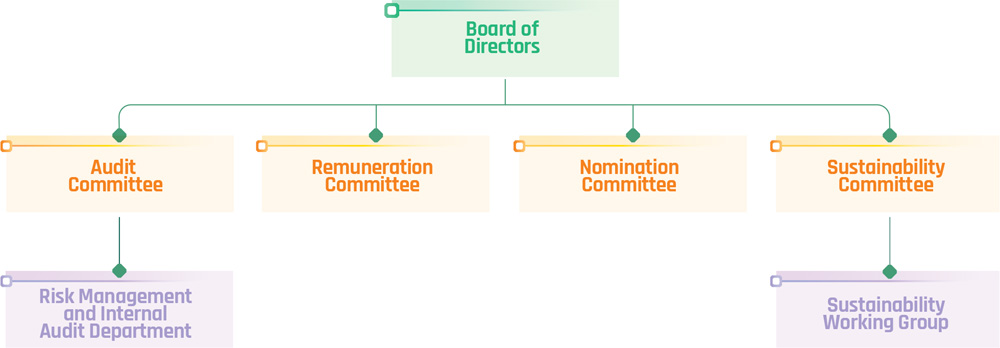
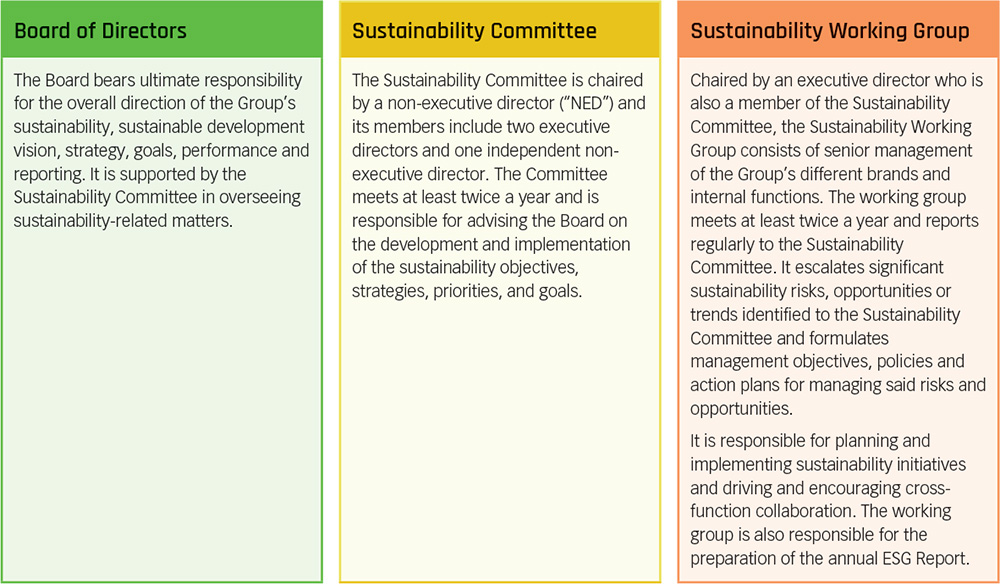
Key ESG Governance Activities in the year
Between 1 January 2024 and the date of this Report, the Sustainability Committee has held two meetings to discuss and evaluate the Group's sustainability-related initiatives. This included reviewing and enhancing our “10-Year Sustainability Plan” and transforming it to the “2030 ESG Strategy Framework”, reviewing and managing the Group’s ESG-related risks, establishing our carbon neutrality goals, making a significant step forward in addressing global climate challenges. For further details, please refer to the “Our Sustainability Framework and Initiatives” section.
To enhance governance and decision-making, the Group’s Board members participated in two training sessions during the year focusing on ESG trends and insights. This ensures they remain informed about evolving regulatory requirements and industry practices. We will continue to explore various training opportunities focused on sustainability and climate-related issues to keep them updated on the latest industry trends and regulatory updates.
Risk Management and Internal Control
Risk management is embedded in our operations and decision-making processes. To ensure robust risk management, the Group regularly evaluates the effectiveness of its risk management approach, with the Board bearing ultimate responsibility for overseeing its performance.
We have established a comprehensive risk management framework that clearly defines the roles and responsibilities of key parties. Our risk governance framework is designed to adapt to a dynamic business environment, ensuring operational effectiveness, compliance with legal and regulatory standards, and the safeguarding of the Group’s assets. In addition, the Group regularly reviews its risk management system to ensure it remains capable of addressing the rapidly changing business environment.
Xtep risk governance organization structure
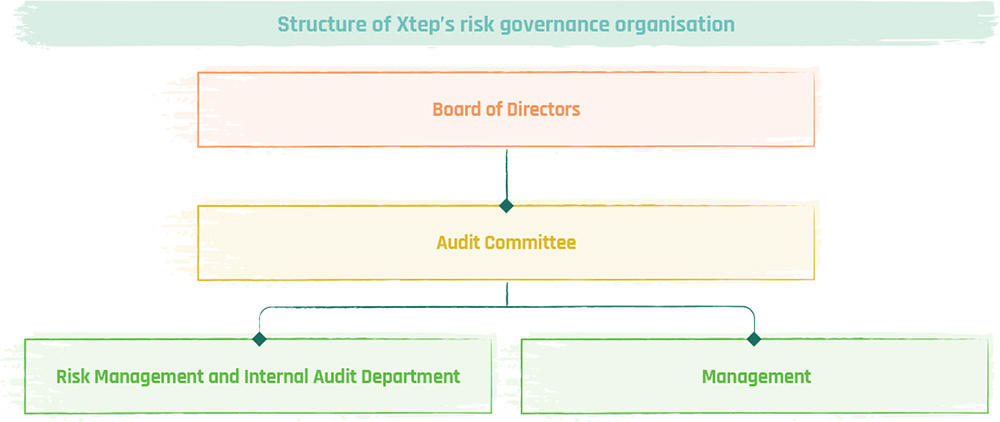
The primary responsibilities of each party in the Group’s risk governance structure are as follows:
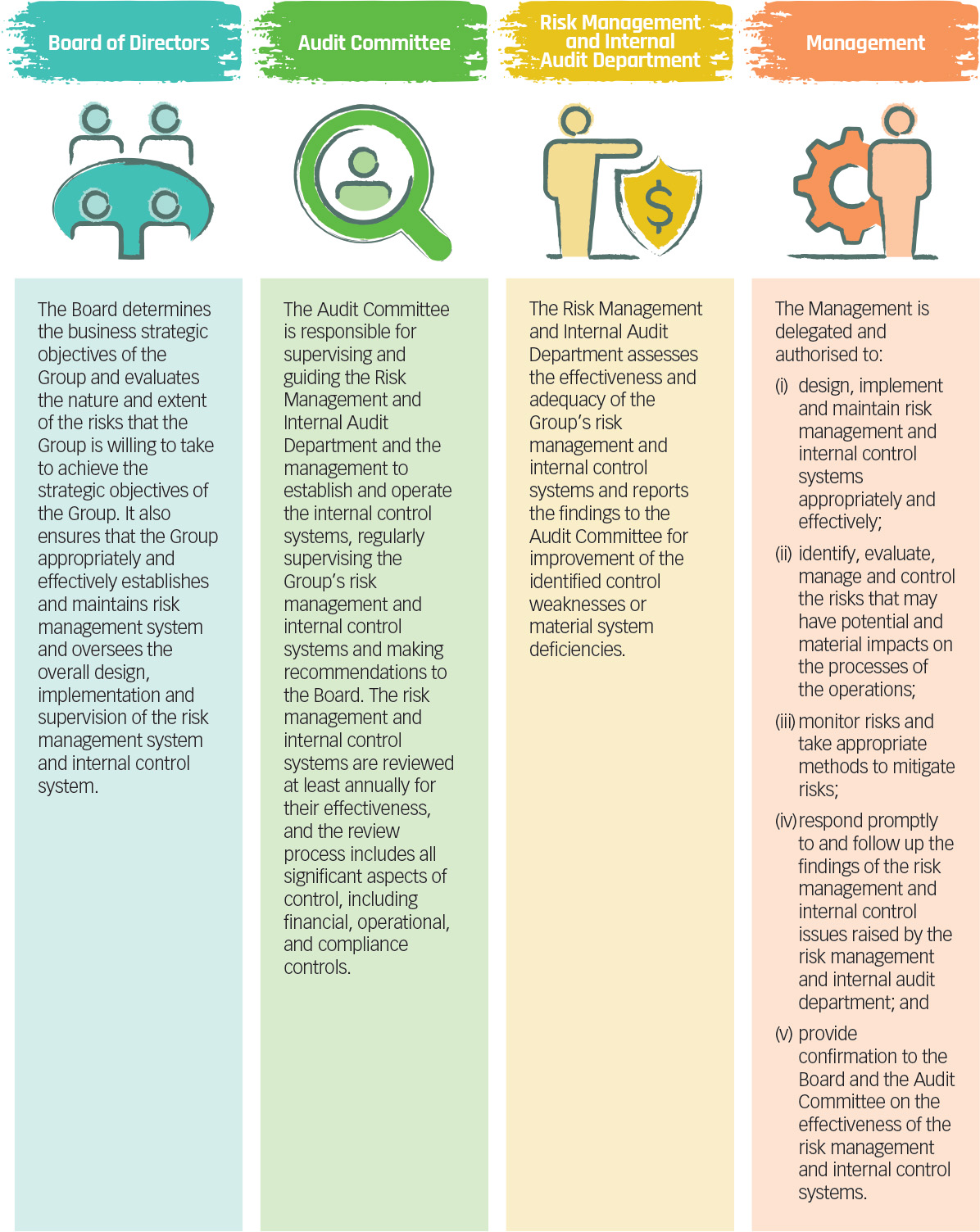
Risk identification and management
We have implemented a risk governance organization structure with defined roles and responsibilities to address and manage risks effectively. Our processes for identifying, assessing and managing material risks are summarized as follows:
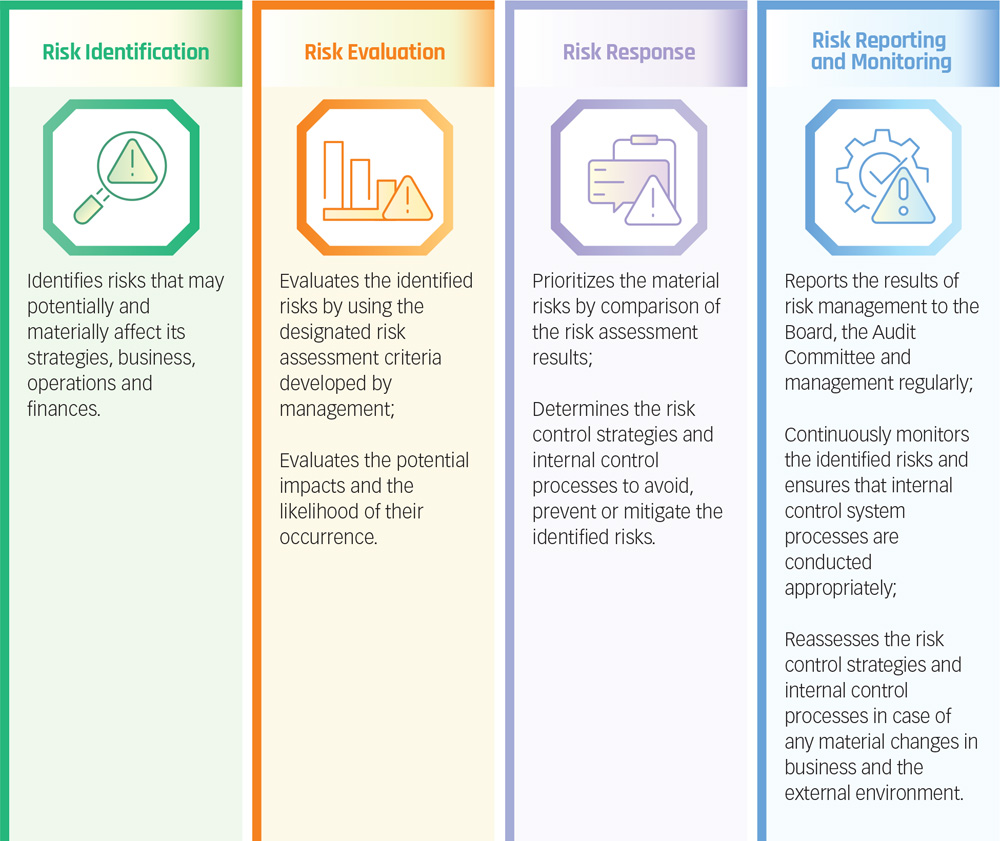
Business Ethics
Maintaining high standards of business integrity and transparency is essential for earning stakeholders’ trust and protecting the Group’s reputation. To this end, we have established relevant policies and measures to ensure adherence to the highest standards of business ethics.
We have implemented a Management Compliance Investigation and Accountability System to standardize handling mechanisms, ensuring significant compliance issues or misconduct in management and operations are addressed appropriately. Additionally, during the year, we provided business ethics training for our salespersons, contractors, suppliers and all employees and required our employees to sign the Employee Integrity Pledge, reinforcing awareness of anti-corruption measures and promoting a culture of integrity.
In recent years, the Group has shared real internal case studies to illustrate potential ethical dilemmas and their appropriate resolutions. This approach helps employees better understand how such situations may arise in their daily work and how to address them effectively.
Internal Audit
Our Internal Audit Department is responsible for carrying out internal audit functions annually, including evaluating the effectiveness of the Group’s risk management and internal control systems, and reporting regularly to the Audit Committee. The Board and the Audit Committee oversee resource allocation to ensure that the Risk Management and Internal Audit Department is provided with sufficient budget and manpower to fulfill its internal audit responsibilities.
Training programs are offered to qualified employees with expertise in maintaining internal audit quality, equipping them with the necessary skills and capabilities to uphold high standards of internal audit performance.
Compliance Management
The Group has implemented preventive, monitoring and controlling measures to ensure compliance with relevant business operation laws and regulations. During the reporting period, the Group complied with all code provisions and, where appropriate, adopted the best-recommended practices as set out in the Corporate Governance Code, except code provision C.2.1 (chairman and chief executive officer).
Under code provision C.2.1 of the Corporate Governance Code, the roles of chairman and chief executive officer should be separate and should not be performed by the same individual. The Group does not separate the roles of the chairman and the chief executive officer at present. Mr. Ding Shui Po is the chairman and chief executive officer of the Group. He has extensive experience in the sportswear industry and is responsible for the Group’s overall corporate strategies, planning and business management. The Board believes that vesting the roles of chairman and chief executive officer in the same individual is beneficial to the business prospects and management of the Group. The balance of power and authority is ensured by the operation of the Board and senior management, which is comprised of experienced and high-caliber individuals. The Board currently consists of four executive directors and three independent non-executive directors and has a vital independence element in its composition.
Anti-corruption
The Group adopts a zero-tolerance approach to corruption, bribery, extortion, fraud, and money laundering. An Anti-fraud Management System has been established to identify, report, and address fraud risks in operations. Guided by national policies such as the Basic Norms for Internal Control and Guidelines for Application of Enterprise Internal Controls, we have developed our Anti-corruption Policy, Anti-fraud Management System, and Code of Integrity, which clearly outline expectations for all employees. Risk assessments are conducted regularly to identify vulnerabilities within key business operations.
Anti-corruption training is provided to employees to ensure they fully understand the expectations and principles outlined in our policies. The training is conducted regularly and shared online with employees for accessibility. For further details, please refer to the Anti-fraud Management System published on the Group’s official website. In 2024, we are not aware of any material non-compliance on corruption, bribery, extortion, fraud and money laundering.
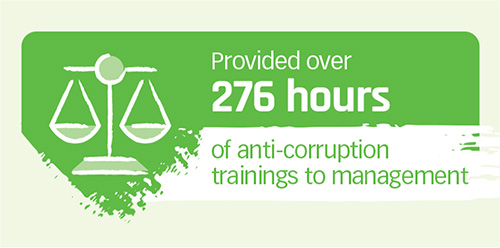
We also recognize the importance of promoting these values throughout the supply chain. All suppliers are required to sign the Incorruptible Cooperation Agreement and commit to adhering to our standards on issues such as bribery and fraud. For more information, please refer to the section — Supplier Assessment and Management for our approach to supply chain management.
Conflict of Interest
Transparent communication of expectations and robust policies enable us to prevent, identify, and effectively mitigate any potential, perceived, or actual conflicts of interest within our operations and across the value chain. The Group has implemented the Employee Conflict of Interest Declaration Management System, which requires employees to submit regular declarations, allowing the Group to make improvements based on the findings from the submitted results.
Our Anti-Corruption Policy also outlines the professional and ethical standards employees must adhere to in all business transactions. All employees are required to regularly report any potential conflicts of interest. Additionally, our Supplier Code of Conduct sets out our expectations and requirements for all suppliers, ensuring their operations align with our ethical standards.
Whistleblowing Policy
To prevent potential misconduct within the Group and its supply chain and to ensure operations adhere to the highest ethical standards, we have established a whistleblowing system. This system allows employees, suppliers (including their employees), and other relevant external stakeholders to anonymously report any actual or suspected misconduct, fraudulent activities, or breaches of policy through confidential channels, such as a dedicated email address, WeChat account, and the monitoring department, for investigation.
The Risk Management and Internal Audit Department, along with the Audit Committee, ensures strict confidentiality of whistleblowers’ identities and related records. Whistleblowers are protected from any form of retaliation, such as unjust dismissal or unwarranted disciplinary action, as detailed in our Anti-fraud Management System. All reports are subject to thorough and proper review and investigation.
In 2024, no whistleblowing report was received from the whistleblowing channels.
Responsible Marketing
We are committed to building meaningful connections with customers through transparent and ethical practices. Whether through product advertising or community initiatives, we are dedicated to accurately representing our offerings, considering sustainability, and earning stakeholders’ trust.
We strictly comply with relevant laws and regulations, including the Advertising Law of the People’s Republic of China, the Anti-unfair Competition Law of the People’s Republic of China and the E-commerce Law of the People’s Republic of China to protect consumer rights and promote the healthy development of the advertising industry. We ensure that all promotional activities and statements across various channels are accurate and do not exaggerate the functions or ESG attributes of our products.
In 2024, no violations related to advertising or labeling of the products and services we provided were identified.
Data security and customer privacy protection
As a company handling a significant amount of customer information, we recognize our responsibility to protect customer data and privacy. In compliance with laws and regulations, including the Cyber Security Law of the People’s Republic of China and the Personal Data (Privacy) Ordinance of Hong Kong, we have established policies such as the Information Security Confidentiality System, Information Security Training Management Standard, Group Information Security Management Policy and Anti-Virus Management Standard. These policies ensure that customer data is collected, stored, used, and protected in an ethical manner.
We have a top-down governance structure for information security, with an Information Security Steering Group responsible for approving the Group’s information security policies. The management team oversees the implementation of these policies to ensure they are effectively carried out.
Our commitment to data security and customer privacy is formally outlined in our Data Governance Policy, which is based on the following core principles:
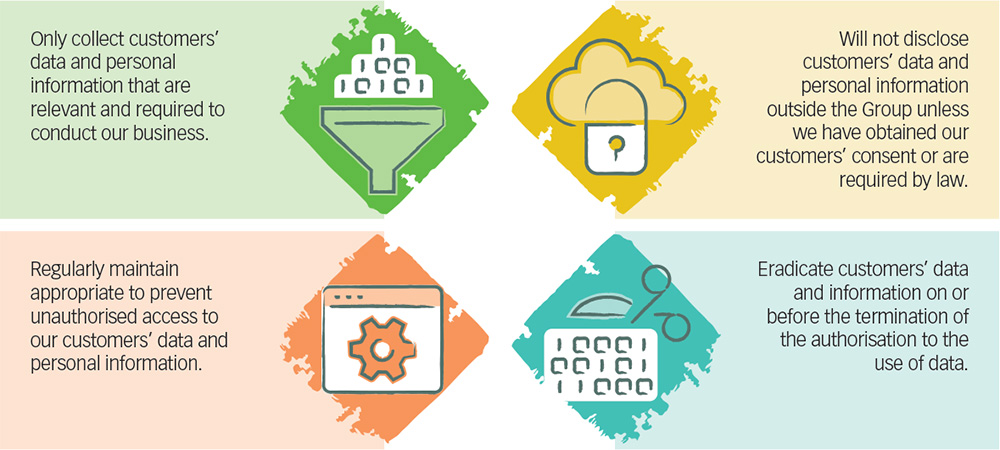
Continuous awareness training is one of our key approaches to protecting customer privacy. We regularly broadcast information security awareness messages in public areas to emphasize the importance of cybersecurity across the organization. Additionally, we conduct training sessions every six months to ensure employees fully understand the significance of information and cybersecurity.
To prevent IT system interruptions and cyberattacks, we operate a 24/7 network and information security monitoring system equipped with automated and manual alert mechanisms to respond promptly to any security issues. We also regularly back up all business data to prevent data loss and conduct bi-annual data recovery tests to evaluate our restoration procedures. Furthermore, we perform annual security drills and risk assessments, including penetration testing and phishing simulations, to proactively identify vulnerabilities and strengthen our security posture and incident response capabilities in today’s ever-evolving threat environment.
We remain committed to continuously enhancing data security measures to meet the latest regulatory requirements and reflect the expectations of our stakeholders.
Intellectual Property Protection
We are committed to upholding intellectual property rights and strictly adhere to the Patent Law of the People’s Republic of China and the Trademark Law of the People’s Republic of China. To protect our valuable intellectual property, the Group has established a comprehensive framework, including the Regulations on Intellectual Property Management, Methods for Patent Applications and Maintenance, and Measures for Rights Protection and Counterfeit Crackdown. To further enhance employees’ understanding of this critical area, we organized four relevant training sessions in 2024, targeting key departments including product development and research and development (“R&D”). As of 31 December 2024, the Group has been granted 2,021 patents.
A dedicated team actively monitors potential infringements and enforces preventive measures. In 2024, we have conducted 2,232 patent-related cases of risk reviewing. The Group has implemented a multi-faceted approach to combat intellectual property infringement, leveraging both online and offline strategies, with total involved amounts exceeding RMB25 million. Additionally, we hold our suppliers to high standards by including confidentiality provisions and other requirements in supplier agreements to safeguard the Group’s intellectual property and patents.

